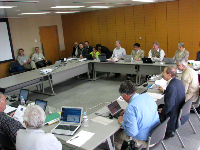 |
 |
|||||||||||||
|
|||||||||||||
|
|||||||||||||
|
Since the end of March, when the detector concept groups delivered their Letters of Intent, the International Detector Advisory Group (IDAG) has been experiencing an intense period. At TILC09 in Japan, the panel worked and interviewed the detector concept groups for three days. All sessions were closed to other participants, but ILC NewsLine wanted to know more about what happened there and understand details about the whole process of detector evaluation. IDAG had to be well prepared. When they received the Letters of Intent (LOI) on 31 March, they only had two weeks to thoroughly read them and send their first questions to the groups. “We have been preparing ourselves for one year, with numerous phone conferences and a few important meetings in Sendai, Warsaw and Chicago,” said Michel Davier, chair of IDAG (more on IDAG). Just five days before TILC09 in Tsukuba, Japan, they were able to send a first set of questions to each concept group to initiate discussions. “We wanted first to make sure we understood the principles underlying each concept and the detector technologies chosen well, and wanted to hear more about certain aspects, especially those which are still not totally established.” These of course could not have happened without a good preparation of the LOI groups. “I would like to stress how impressed we were by their work,” said Davier. “Not only did they deliver their fully-documented Letters on time but the quality was also really appreciated.” IDAG acknowledged that these LOIs actually reflect years of effort, which of course gives them a great value. The high number of signatories all over the world also reflects the deep interest of the particle physics community in this future machine. During IDAG closed sessions, LOI groups first had to answer questions about their R&D and sub-detector choices and about the physics performance of their detectors. One of the tools particle physicists use to measure these performances is called benchmarking. They study – and simulate – a set of standard particle physics reactions within different energy and cross section ranges. Some are already well-known predictions based on the Standard Model, others are processes predicted by new physics theories like Supersymmetry. These reactions are chosen for their complementarities and their faculty of revealing the performance of the different subdetectors. At Tsukuba, the benchmarking discussion was the only closed session where all concepts were invited in the same room. “These are not questions which are specific to one concept,” explained Davier. “It's a common exercise and we thought it would be more efficient to interview them at the same time.” Actually, it was also one of the few areas where detector concepts worked together: they used common event generators and shared their event productions. IDAG left Tsukuba with a list of new questions to the groups. Some were dedicated questions and others were common for the three concepts. Among them, LOI groups will have to explain in detail how they plan to calibrate and align their detectors in the context of frequent push-pull manipulations (when the two ILC detectors interchange). “This is particularly crucial for the ILC, and subdetector alignment and calibration will have to be established with high precision in the shortest possible time,” said Davier. The LOIs also have to take into account the new ILC recommendations on Functional Requirements on the Design of the Detectors and the Interaction Region of an e+e- Linear Collider with a Push-Pull Arrangement of Detectors which was published at the beginning of April. IDAG will judge if the detector concepts can demonstrate a reliable and efficient procedure taking into account machine and detector interface issues. The concepts and IDAG will meet for the last time before validation in June at Orsay, France, and the final answer will be delivered in Albuquerque, US in autumn. “We are going through an intense and exhausting period but it is worth it and I'm confident IDAG will be able to deliver their answer based on objective arguments,” said Davier. “It is a pleasure that the process is going on so well, with a very well-chosen team of experts within IDAG and with very good communication with the LOI groups. Despite the tense period, the evaluation is happening in a excellent atmosphere.” -- Perrine Royole-Degieux Read also Michel Davier's closing talk at TILC09 | |||||||||||||
| © International Linear Collider |
